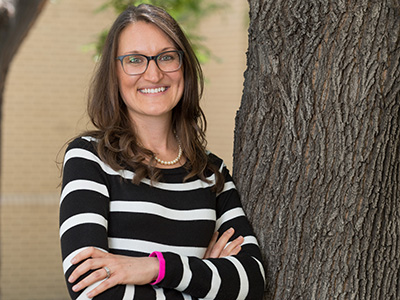
U.S. publicly traded companies must enlist the services of an audit committee, an independent, outside group appointed by a company’s board of directors to oversee financial reporting and disclosures — a vestige of the Sarbanes-Oxley Act to better protect shareholders following the financial scandals of the early 2000s.
For some, the committee is seen as a rubber stamp for management actions. However, new research by Colorado State University Assistant Professor Michelle Draeger suggests that audit committees might be more influential than previously thought.
Draeger, a faculty member in the College of Business’ Department of Accounting, recently co-authored several research papers examining the involvement and impact of audit committees in earnings reports and the balance of power between corporate management and the audit committee.
“There’s a whole stream of literature that says the audit committee just blesses what management does — they’re window dressing,” she said. “We’re finding on numerous occasions that audit committees are actually having a strong influence, and they’re able to overcome management pressures and are making some improvements within the audit process.”
The balance of power
In a paper for Accounting Horizons, Draeger and co-authors Mikhail Sterin of Texas State University and Jacob Haislip of Texas Tech University found that audit committees play a role in earnings announcement timeliness and reliability.
According to the research, more powerful audit committees are positively associated with earnings announcements issued closer to audit completion as well as with delays in earnings announcements.
Draeger had first-hand experience witnessing the impact of audit committees and their relationship with management as an external auditor for Deloitte in Wisconsin and CliftonLarsonAllen in Colorado.
“As auditors, we always thought it was interesting that we would be in a middle of an audit, and management would want to release the earnings number, and the audit is not even done yet,” she said. “That puts pressure on the auditors because if they do find something that’s wrong with the number, then management has to say, ‘Oops we’re wrong.’”
Conversely, Draeger also examined executive management’s influence on audit committees in a paper published in A Journal of Practice and Theory, co-authored by Sterin and Nathan Berglund of Mississippi State University.
Following the Enron and Arthur Andersen scandals, Draeger explained, Sarbanes-Oxley established rules and regulations designed to prevent executive management from tampering with audit committees.
“Everyone has assumed since then that audit committees are truly independent because they’re not members of management,” Draeger said. “No one has really looked at the other ways that they might not be independent in terms of going-concern opinions, which is considered a very direct measure of auditor independence.”
The researchers focused on going-concern opinions — assessments by auditors in financial reporting that relate to a business’ ability to continue to meet its financial obligations within a 12-month period — as a way to further examine independence.
Examining the relative tenure of executives and audit committee members, Draeger found that greater management influence is associated with a lower propensity of the auditor to issue a modified going-concern opinion to a distressed client.
Additionally, the research found that greater management influence is associated with increased “opinion shopping,” the practice of finding an outside auditor willing to provide a favorable view of a company’s financial condition.
Interest in audit committees
In her research, Draeger has also become interested in annual company proxy statements released prior to shareholder meetings, which include an audit committee report covering meetings with management and auditors and approvals of financial statements.
In a second paper for Accounting Horizons, Draeger and co-authors Jimmy Downes of the University of Nebraska-Lincoln and Abbie Sadler of the University of Richmond investigated the link between audit quality and firms’ voluntary disclosures that indicate their audit committees’ higher involvement in the partner selection process.
“It’s kind of unusual to see companies and audit committees providing more than the basics,” she said.
They found that companies that voluntarily disclose involvement in the selection of new audit partners — within proxy statements filed with the Securities and Exchange Commission — had fewer misstatements and exhibited a lower likelihood of managing earnings — manipulating financial records to improve the appearance — than those that didn’t disclose.
Draeger said her fascination with audit committees stems from her background as an external auditor. For her dissertation at Oklahoma State University, she pored over audit committee minutes.
Draeger credits her interest in accounting and later teaching to an accounting professor at Marquette University in Milwaukee. “It was always something I’ve thought about,” she said, “and the timing worked out.”
Draeger added that the cohort of College of Business faculty members, such as Professor Derek Johnston and Assistant Professor Eric Rapley, have been instrumental in her work at CSU.
“As a junior faculty member, we rely on more senior faculty members to help us through the (publication) process,” she said. “I relied on Derek and Eric in parts of the process because you’re sometimes too close to the paper to see those flaws that outsiders do. They were instrumental, and you don’t see that at a lot of other institutions.”